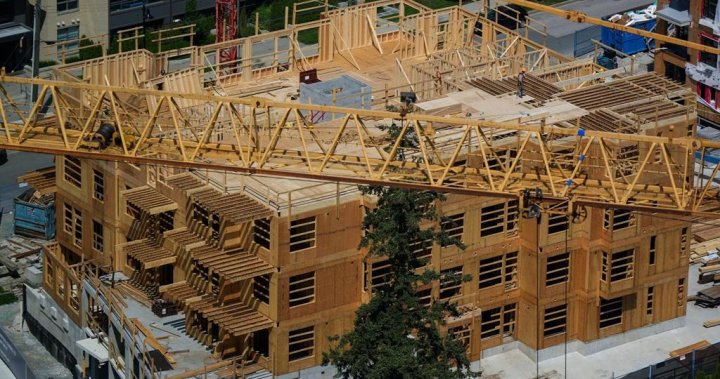Municipalities across Canada are waiting to find out if they will get a piece of the federal government’s $4-billion Housing Accelerator Fund (HAF).
But as they wait, there are growing calls for a “wartime” effort to build more houses and concerns about whether the fund’s budget will stretch far enough.
“Five years ago, $4 billion would have seemed like you could buy the world,” Halifax Mayor Michael Savage said.
“Now, $4 billion seems to be much less when you look at the amounts of money that have been committed, in the budgets of the federal government, even provincial governments. But, you know, $4 billion is not bad, right?”
Applications for the HAF were set to close on Aug. 18, with the goal of helping municipalities fast-track the process of building new homes and add 100,000 new homes nationwide over the next three years. However, the small, northern and Indigenous application stream has been extended until Sept. 29.
The applications called on municipalities to put forward “action plans” to increase their “housing supply growth target” by at least 10 per cent.
Calgary Coun. Courtney Walcott says his city is looking at building an extra 3,000 housing units annually. It’s a goal he says isn’t achievable without support from both the provincial and federal governments, but much more money will be needed to fix Canada’s housing crisis.
“To be honest, $4 billion is a drop in the bucket,” Walcott said.
“We’re looking at a crisis on a national level. And when you’re thinking about what is actually required to address this, we’re looking at a wartime spending effort that is required to move on the housing crisis.”
That call echoes one raised this week by Mike Moffat with the Smart Prosperity Institute, who urged governments to get money into the hands of municipalities to build in “a war-time-like effort.”

Some of the action plans submitted to the Housing Accelerator Fund include proposals for accelerating project approvals, incentivizing affordable housing and changing zoning rules to allow for increased density.
Densification also plays a central role in Ottawa’s plans, and was cited by Prime Minister Justin Trudeau on Wednesday as one part of addressing the housing crunch.
“We see densification, we see proper partnerships with provinces as part of the solution. We don’t see building on conserved land as part of the solution,” he said in response to a question about the Ontario government’s plan to build on the Greenbelt.
City of Ottawa Coun. Jeff Leiper says in the country’s capital, more than half of its coming growth is expected to take place in already serviced parts of the city.
He says these types of developments almost always draw opposition from residents, but believes the city just needs to be transparent about why it’s planning the way it is.
“I think everyone understands that cities can’t continue to grow as they have in the postwar period through sprawl. We can’t continue to grow and accommodate the new residents who are coming into our cities by going further and further out into natural areas, into agricultural lands,” Leiper said.
Ottawa’s application to the Housing Accelerator Fund is seeking around $150 million to help build 4,000 new housing units.

In Halifax, Savage says his city is facing a major housing crunch driven by a rapidly growing population, the overall cost of building materials, a lack of skilled labourers to build homes and high interest rates slowing development.
On the population front, the city has had to revise its growth plan.
Initially, the city projected its population to hit 550,000 by 2031. However, in the last six years, Halifax’s population has grown by 64,000, hitting the 480,000 mark and making the city revise its 2031 target to 625,000.

It’s an issue also seen in the Greater Vancouver Area city of Maple Ridge, B.C.
Mayor Dan Ruimy expects the city of 95,000 to add 20,000 to 30,0000 more residents over the next decade, ramping up pressure on municipal planners.
“So we’re tasked with trying to figure out how to make that happen. But on top of housing, it’s not just housing, it’s infrastructure,” Ruimy said.
“If we hit our targets of building permits to fund, we can use those funds pretty much for almost anything that we see fit. We could buy land if we need to. We can use it to increase our road capacity. We can use it to build infrastructure.”
To accommodate the growth, Maple Ridge is looking to hit a 20 per cent housing supply increase annually in its application.
A ‘good start,’ but not enough?
A recent analysis from Desjardins says the Housing Accelerator Fund is a “good start” in trying to address the housing crisis, but “it’s insufficient to move the needle.”
The analysis goes on to call for more targeted transfers and looking at GST/HST exemptions on purpose-built rental housing as policies that could work in tandem.
The Canada Mortgage and Housing Corporation says it will begin processing and assessing applications later this year, with successful applicants getting an advance to start their action plan, followed by three annual payments, ending in 2026-27.
Savage is also the current chair of Canada’s Big City Mayors Caucus, and says the problem of adding more housing is “universal” for member cities.
“We need more housing units. I think every mayor, just about every mayor in the country has significant homeless populations that we’re trying to deal with,” Savage said, adding that he views the fund overall as a positive move.
“I’ve always said that when it comes to housing, the feds have the money, the province the responsibility, but the cities have the problem. So we have to get all orders of government together.”




